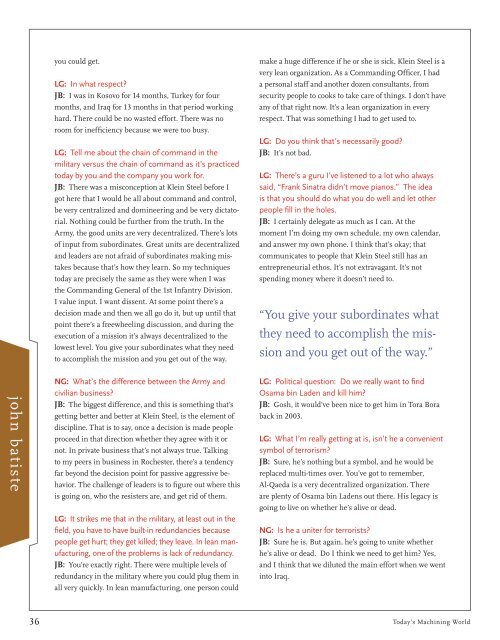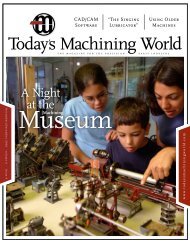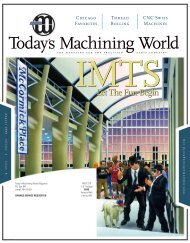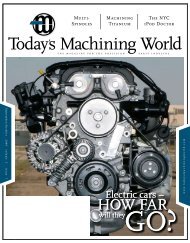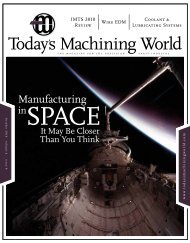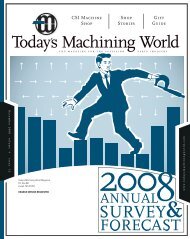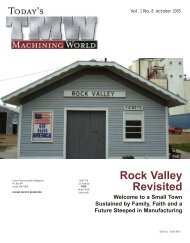Recycled - Today's Machining World
Recycled - Today's Machining World
Recycled - Today's Machining World
You also want an ePaper? Increase the reach of your titles
YUMPU automatically turns print PDFs into web optimized ePapers that Google loves.
john batiste<br />
36<br />
you could get.<br />
LG: In what respect?<br />
JB: I was in Kosovo for 14 months, Turkey for four<br />
months, and Iraq for 13 months in that period working<br />
hard. There could be no wasted effort. There was no<br />
room for inefficiency because we were too busy.<br />
LG: Tell me about the chain of command in the<br />
military versus the chain of command as it’s practiced<br />
today by you and the company you work for.<br />
JB: There was a misconception at Klein Steel before I<br />
got here that I would be all about command and control,<br />
be very centralized and domineering and be very dictato-<br />
rial. Nothing could be further from the truth. In the<br />
Army, the good units are very decentralized. There’s lots<br />
of input from subordinates. Great units are decentralized<br />
and leaders are not afraid of subordinates making mis-<br />
takes because that’s how they learn. So my techniques<br />
today are precisely the same as they were when I was<br />
the Commanding General of the 1st Infantry Division.<br />
I value input. I want dissent. At some point there’s a<br />
decision made and then we all go do it, but up until that<br />
point there’s a freewheeling discussion, and during the<br />
execution of a mission it’s always decentralized to the<br />
lowest level. You give your subordinates what they need<br />
to accomplish the mission and you get out of the way.<br />
NG: What’s the difference between the Army and<br />
civilian business?<br />
JB: The biggest difference, and this is something that’s<br />
getting better and better at Klein Steel, is the element of<br />
discipline. That is to say, once a decision is made people<br />
proceed in that direction whether they agree with it or<br />
not. In private business that’s not always true. Talking<br />
to my peers in business in Rochester, there’s a tendency<br />
far beyond the decision point for passive aggressive be-<br />
havior. The challenge of leaders is to figure out where this<br />
is going on, who the resisters are, and get rid of them.<br />
LG: It strikes me that in the military, at least out in the<br />
field, you have to have built-in redundancies because<br />
people get hurt; they get killed; they leave. In lean manufacturing,<br />
one of the problems is lack of redundancy.<br />
JB: You’re exactly right. There were multiple levels of<br />
redundancy in the military where you could plug them in<br />
all very quickly. In lean manufacturing, one person could<br />
make a huge difference if he or she is sick. Klein Steel is a<br />
very lean organization. As a Commanding Officer, I had<br />
a personal staff and another dozen consultants, from<br />
security people to cooks to take care of things. I don’t have<br />
any of that right now. It’s a lean organization in every<br />
respect. That was something I had to get used to.<br />
LG: Do you think that’s necessarily good?<br />
JB: It’s not bad.<br />
LG: There’s a guru I’ve listened to a lot who always<br />
said, “Frank Sinatra didn’t move pianos.” The idea<br />
is that you should do what you do well and let other<br />
people fill in the holes.<br />
JB: I certainly delegate as much as I can. At the<br />
moment I’m doing my own schedule, my own calendar,<br />
and answer my own phone. I think that’s okay; that<br />
communicates to people that Klein Steel still has an<br />
entrepreneurial ethos. It’s not extravagant. It’s not<br />
spending money where it doesn’t need to.<br />
“You give your subordinates what<br />
they need to accomplish the mis-<br />
sion and you get out of the way.”<br />
LG: Political question: Do we really want to find<br />
Osama bin Laden and kill him?<br />
JB: Gosh, it would’ve been nice to get him in Tora Bora<br />
back in 2003.<br />
LG: What I’m really getting at is, isn’t he a convenient<br />
symbol of terrorism?<br />
JB: Sure, he’s nothing but a symbol, and he would be<br />
replaced multi-times over. You’ve got to remember,<br />
Al-Qaeda is a very decentralized organization. There<br />
are plenty of Osama bin Ladens out there. His legacy is<br />
going to live on whether he’s alive or dead.<br />
NG: Is he a uniter for terrorists?<br />
JB: Sure he is. But again, he’s going to unite whether<br />
he’s alive or dead. Do I think we need to get him? Yes,<br />
and I think that we diluted the main effort when we went<br />
into Iraq.<br />
Today’s <strong>Machining</strong> <strong>World</strong>


